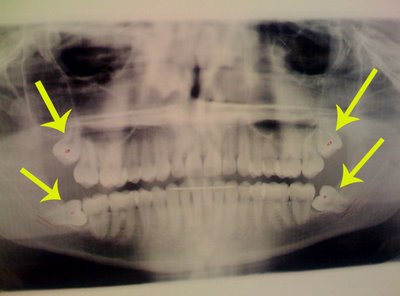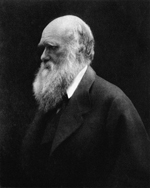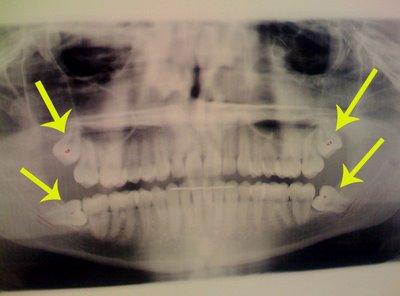Wisdom Teeth – Word of the Week
Definition: Wisdom Teeth
Noun: One of four rearmost molars on each side of our upper and lower jaw. Wisdom teeth are the last teeth to grow, usually in early adulthood.
Pronunciation: wĭz'dəm tiːθ

Example: - My mouth hurts! - It's probably your wisdom teeth coming up!
Have you ever wondered why we call the teeth at the backs of our mouths wisdom teeth?
The usual answer is that they're thought to be called "wisdom teeth" because they appear so late—much later than the other teeth, at an age in which people are supposed to be wiser than children - which is when all your other teeth grow. Easy isn’t it?
The real origin of the word is more complicated though.
The term Wisdom Teeth comes from a mistranslation of the Dutch word for these teeth, 'verstandskiezen', literally 'far-standing-molars', referring to the fact that they are located at the back of the mouth. In Dutch, such compound words are contracted, (written without the spaces) leaving the first part of the word as 'verstand' which can correctly be translated as 'wisdom' or 'understanding', in English.
While a lot of languages simply mirror the English version, there are a couple of languages where it is expressed differently.
For example:
- Turkish refers directly to the age at which wisdom teeth appear and calls it '20 yaş dişi' (20th year tooth).
- In Korean, its name is 'Sa-rang-nee' (사랑니, love teeth) referring to young adulthood and the pain of first love.
- In Japanese, its name is 'Oyashirazu' (親知らず), literally meaning "unknown to the parents," from the idea that they erupt after a child has moved away.
- The Indonesian term 'gigi bungsu' refers to bungsu, meaning "youngest child", because the teeth erupt so much later than the others, implying that the teeth are "younger" than the rest.
- In Thailand, the wisdom tooth is described as 'fan-khut' (ฟันคุด) or "huddling tooth," due to the shortage of space for each one.
There are many complications that can happen with your wisdom teeth. If you are lucky you will feel no pain at all, and might not even develop them (humans are evolving smaller wisdom teeth because we don't need them).
Removing these teeth surgically is common nowadays, since we don’t need them and the pain they cause can stop us from being able to eat (which would have been very bad for our ancestors who lived before modern dentistry!).
But why do we still have them?
Anthropologists believe wisdom teeth, or the third set of molars, were evolution's answer to our ancestor’s early diet of coarse, rough food – like leaves, roots, nuts and meats – which required more chewing power and resulted in excessive wear of the teeth. The modern diet with its softer foods, along with marvels of modern technologies such as forks, spoons and knives, has made the need for wisdom teeth non-existent.

As our diets changed around 5,000 to 3,000 years ago, our jaws got smaller. Because a smaller jaw was more attractive in many cultures, having one meant you were more likely to get married and have children. But our wisdom teeth stuck around. When they come out, they can cause infections, and a lot of pain, causing us to be unable to eat - and maybe even starve to death.
If this happened 500 years ago, you wouldn't live long enough to have children, meaning your genes for having large wisdom teeth in a small jaw wouldn't get passed along!
As a result, evolutionary biologists now classify wisdom teeth as vestigial organs, or body parts that have no function due to evolution.
Have your wisdom teeth erupted already? How did it feel?

